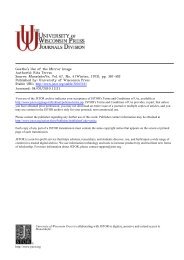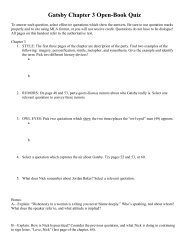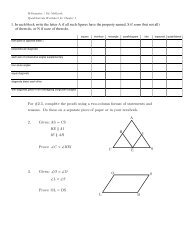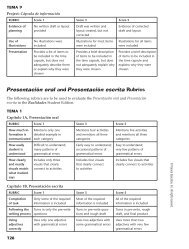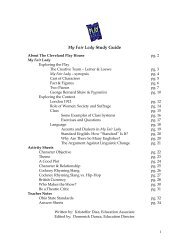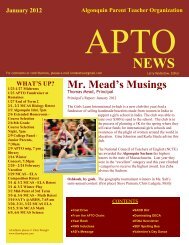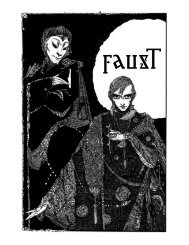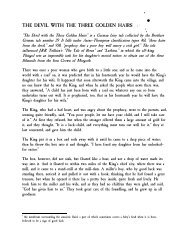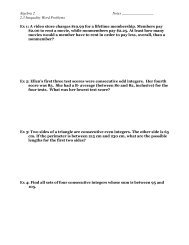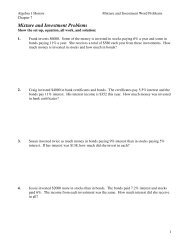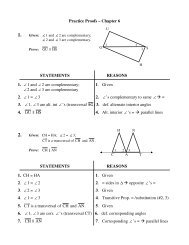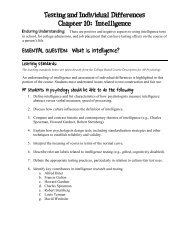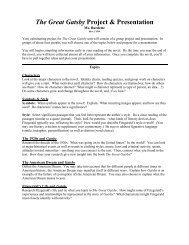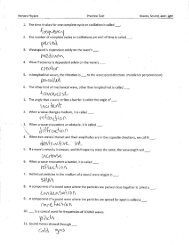Ghosts Critical Essay
Ghosts Critical Essay
Ghosts Critical Essay
You also want an ePaper? Increase the reach of your titles
YUMPU automatically turns print PDFs into web optimized ePapers that Google loves.
IBSEN'S GHOSTS AS TRAGEDY?<br />
edged within himself a contradiction between<br />
word and action, between will and task, between<br />
life and teaching on the whole? Or who is there<br />
among us who has not selfishly been sufficient<br />
unto himself, and half unconsciously, half in<br />
good faith, has extenuated this conduct both<br />
to others and to himself?"<br />
The alternative interpretation of<br />
<strong>Ghosts</strong> is the one which I have outlined<br />
in this essay. Mrs. Alving is a victim in<br />
a conflict over which she has no control.<br />
What are the implications of such a<br />
view to tragedy?<br />
In 1869 Ibsen wrote a significant letter<br />
to the critic George Brandes. In this<br />
letter he says:<br />
"There is without doubt a great chasm opened<br />
between yesterday and today. We must continually<br />
fight a war to the knife between these<br />
epochs."<br />
What Ibsen meant in this letter was that<br />
to live in the modern world is to be, in<br />
many important ways, different from<br />
anyone who ever lived before. Now this<br />
doesn't mean that man has changed;<br />
human nature is still the same, but<br />
Ibsen felt that the modern way of looking<br />
at man had changed in a way that<br />
was significantly new.<br />
Joseph Wood Krutch pursues this<br />
problem in his recent book, "Modernism"<br />
in the Modern Drama. Krutch<br />
develops his argument by pointing out<br />
that since Greek times the Aristotelian<br />
dictum that "man is a reasoning animal"<br />
had been pretty universally accepted.<br />
This view did not deny man's irrationality,<br />
but it did assert that reason is the<br />
most significant human characteristic.<br />
Man is not viewed as pre-eminently a<br />
creature of instincts, passions, habits, or<br />
conditioned reflexes; rather, man is a<br />
creature who differs from the other animals<br />
precisely in the fact that rationality<br />
is his dominant mode.<br />
The modern view assumes the op-<br />
posite premise. In this view men are not<br />
sane or insane. Psychology has dissolved<br />
179<br />
such sharp distinctions; we know that<br />
normal people aren't as rational as they<br />
seem and that abnormal people don't<br />
act in a random and unintelligible way.<br />
In short, the dramatist of our age has<br />
had to face the assumption that the<br />
rational is relatively unimportant; that<br />
the irrational is the dominant mode of<br />
life; and that the artist must realize,<br />
therefore, that the richest and most<br />
significant aspects of human experience<br />
are to be found in the hidden depths of<br />
the irrational. "Man tends to become<br />
less a creature of reason than the victim<br />
of obsessions, fixations, delusions, and<br />
perversions."5<br />
It is this premise that all of the great<br />
dramatists at the end of the igth century,<br />
beginning with Ibsen, had to face.<br />
How is one to live in an irrational<br />
world! How is one to give meaning to<br />
life in a world where you don't know<br />
the rules? How are human relationships<br />
to be meaningfully maintained when<br />
you can't be sure of your feelings and<br />
when your feelings can change without<br />
your knowing it? Ibsen's plays, beginning<br />
with <strong>Ghosts</strong>, dramatize man<br />
destroyed by trying to live rationally in<br />
such a world. But to accept irreconcilable<br />
conflict as the central fact of all<br />
life; to make dissonance rather than the<br />
harmony of reconciliation the condition<br />
of the universe is to accept as a premise<br />
a view of life which leads in drama, as<br />
in life, to a world in which men and<br />
women, heroes and heroines, become<br />
victims in a disordered world which they<br />
have not created and which they have<br />
no moral obligation to correct.<br />
It is this process, which began in the<br />
drama when Ibsen came to see man as<br />
a victim of irrational powers, of the<br />
Trolls, over which he has no control,<br />
that leads to the sense of futility that so<br />
5 J. W. Krutch, "Modernism" in Modern<br />
Drama, Ithaca, N. Y., 1953, p. 22.



